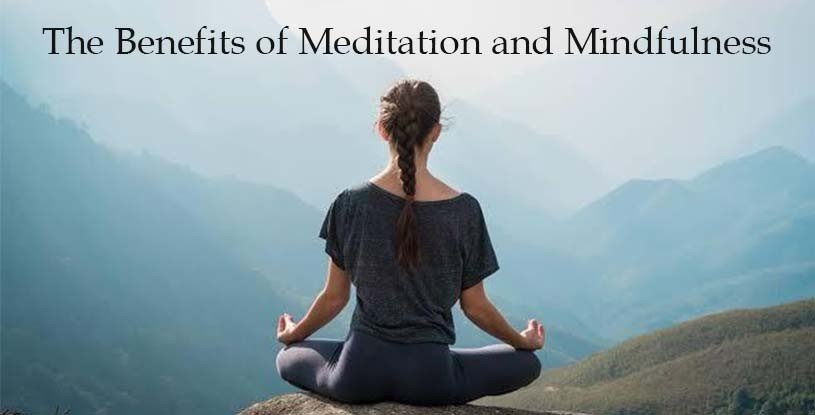The Benefits of Meditation and Mindfulness: The Mind-Body Connection
Benefits of Meditation and Mindfulness

In today’s fast-paced world, it feels like there’s always something demanding our attention. Whether it’s work, social media, or just the hustle of daily life. Finding peace and quiet can seem impossible sometimes.
But guess what? There’s a simple trick to reconnect with yourself: meditation and mindfulness. These practices have been around for centuries, and they’re still going strong because they actually work! They help clear your mind, reduce stress, and improve your overall well-being.
Moreover, with more research backing them up, meditation and mindfulness have become a huge part of modern wellness.
In this post, I’m diving into the awesome benefits of meditation—especially when it comes to the mind-body connection and how bringing a little zen into your life can seriously boost both your physical and emotional health.
What is Meditation and Mindfulness?
Before we dive into all the amazing benefits of meditation, it’s important to get clear on what meditation and mindfulness actually mean, especially since people often use them interchangeably.
Meditation is all about tuning into your mind and cutting out distractions to reach a state of heightened awareness and focus. There are different types of meditation you can try, like guided meditation, mantra meditation, or mindfulness meditation. Usually, you’ll find a quiet space, close your eyes, and focus on your breath, body sensations, or even a specific thought to help calm your mind and get more present.
Mindfulness, on the other hand, is the art of being fully present in the moment—without any judgment. It’s about paying attention to your thoughts, feelings, bodily sensations, and even the world around you with a non-reactive attitude.
The best part? You can practice mindfulness anytime, anywhere—whether you’re eating, walking, or even doing something as simple as folding laundry. It’s all about being aware of what’s happening right now, instead of getting lost in the past or stressing about the future.
While meditation and mindfulness are different in how they’re practiced, they share a common goal. Helping you become more aware and connected to the present moment.

The Mind-Body Connection
The mind-body connection is all about how our mental and physical health are deeply intertwined. In simple terms, the way we think and feel can directly affect our body, and vice versa. For example, stress or anxiety can lead to physical problems like headaches, muscle tension, or stomach issues. On the flip side, dealing with physical health problems can also make us feel emotionally drained or stressed out.
That’s where meditation and mindfulness come in! These practices are proven to positively impact both your mental and physical health. It helps to strengthen that mind-body connection. By training your mind to focus, let go of negative thoughts, and stay more present, you can enjoy a whole bunch of benefits, both mentally and physically. It’s like giving your body and mind a little reset button!
Benefits of Meditation: Mental Health Improvements
One of the most powerful benefits of meditation is its positive impact on mental health. If you make meditation a regular part of your routine, it can help reduce symptoms of anxiety, depression, and stress, leading to a calmer and more balanced life. Here are some key mental health benefits that meditation and mindfulness can offer:
Stress Reduction
Stress is pretty much a part of everyday life, but when it’s constant, it can start to take a toll on both your mind and body. Chronic stress is linked to health problems like heart disease, digestive issues, and even a weakened immune system. Meditation helps by activating the body’s relaxation response, which counters the fight-or-flight reaction triggered by stress. Research shows that meditation can lower cortisol, the stress hormone. Mindfulness practices also help you stay present, which can prevent you from getting caught up in a cycle of worry and overthinking.
Improved Emotional Regulation
Mindfulness meditation can really help you manage your emotions better. When you practice mindfulness, you become more aware of your feelings as they come up, which gives you the space to respond thoughtfully instead of reacting impulsively. This leads to better emotional stability and a greater sense of control over your reactions. Studies suggest that regular meditation can increase gray matter in the brain, specifically in areas responsible for emotional regulation. This helps you keep your emotions in check and reduces negative feelings like anger, sadness, or anxiety.
Reduction in Anxiety and Depression Symptoms
Anxiety and depression can be tough to deal with, but the good news is meditation can help. Research has shown that mindfulness practices like mindfulness meditation and mindfulness-based cognitive therapy can significantly reduce symptoms of both conditions. Mindfulness helps you become more aware of your thoughts and feelings. It allows you to break free from those negative thought loops that fuel anxiety and depression. By practicing meditation, you also learn to accept your thoughts and emotions without judgment, which can help quiet the constant mental chatter that often makes things worse.
Increased Self-Awareness and Self-Acceptance
Meditation encourages you to look inward and reflect on your emotions, behaviors, and thought patterns. The more you practice, the better you’ll understand why you react the way you do in certain situations. This self-awareness fosters personal growth and helps you develop more self-acceptance. When you practice self-compassion, you’re less likely to feel inadequate, which leads to better overall mental health.
By weaving meditation and mindfulness into your life, you can see major improvements in your emotional well-being. Whether it’s lowering stress, regulating emotions, or simply accepting yourself more, these practices offer valuable tools for better mental health.
Physical Health Benefits of Meditation
Meditation isn’t just good for your mind—it’s also great for your body! The mind and body are closely connected, so taking care of your mental health can also bring some big benefits to your physical health. Here are some ways regular meditation can help keep you feeling your best:
1. Improved Immune Function
Your immune system is constantly working to protect you from illness and infection. Meditation can give it a boost by reducing stress and promoting relaxation. Chronic stress actually weakens the immune system, making it easier for illnesses to sneak in. But when you meditate, you’re helping to lower stress and increase your relaxation response. It strengthens your immune system and helps your body fight off infections more effectively.
2. Better Sleep Quality
We all know how important sleep is for both mental and physical health, but many of us struggle with falling asleep or staying asleep. Meditation can help improve sleep quality by calming your mind and cutting down on the mental chatter that keeps you tossing and turning at night. Mindfulness practices, especially, can teach you to focus on the present moment and let go of worries about the future or regrets about the past—two major sleep disruptors. As a result, meditation can help you fall into a deeper, more restful sleep.
3. Reduction in Chronic Pain
Chronic pain—whether it’s from arthritis, fibromyalgia, or back pain—affects many people. While meds and physical therapy are common treatments, meditation can also make a big difference in managing pain. Mindfulness meditation helps shift the way the brain processes pain signals. Studies have shown that mindfulness can reduce the emotional distress that often accompanies chronic pain, making it easier to tolerate. Meditation also teaches acceptance and detachment, which can help reduce how intensely we experience pain.
4. Lower Blood Pressure and Better Heart Health
High blood pressure is a major risk factor for heart disease and stroke, but meditation can help lower it. By encouraging relaxation and reducing stress, meditation helps prevent the blood pressure spikes that happen when the body is stressed. Research has shown that people who meditate regularly experience significant reductions in both systolic and diastolic blood pressure. Plus, the emotional regulation and anxiety-reducing benefits of meditation contribute to overall heart health, helping lower the risk of cardiovascular disease.
Meditation is an easy, low-cost way to improve your physical health, just as it helps your mental well-being. Whether you’re looking to boost your immune system, get better sleep, manage chronic pain, or protect your heart. It makes meditation part of your routine that can lead to big health benefits all around!

How to Get Started with Meditation and Mindfulness
If you’re ready to experience the benefits of meditation and mindfulness, don’t worry—it’s easier than you might think to get started. Here are some simple tips to help you begin your journey:
Start Small
If you’re new to meditation, keep it simple! Start with just a few minutes each day—5 to 10 minutes is a great starting point. As you get more comfortable with the practice, you can gradually add more time.
Find a Quiet Space
It helps to have a quiet, comfortable spot where you won’t be easily distracted. Sit in a relaxed position, with your back straight to keep your body comfortable, and close your eyes if that feels good to you.
Focus on Your Breath
One of the simplest ways to meditate is by focusing on your breath. Pay attention to the sensation of the air as it enters and leaves your body. If your mind starts to wander, gently bring your focus back to your breath—no judgment, just awareness.
Be Patient With Yourself
Meditation and mindfulness are like any new skill—they take time to master. Don’t be too hard on yourself if your mind drifts or if it’s tough to stay focused. With regular practice, you’ll start noticing the positive effects on both your mind and body. Starting small and being consistent is key! The more you practice, the more natural it will feel, and before you know it, you’ll be reaping the rewards of a calmer, more mindful life.
Meditation: The Mind-Body Connection
The benefits of meditation and mindfulness are pretty incredible, offering everything from better mental health to improved physical well-being. These practices work by strengthening the mind-body connection, helping you manage stress, reduce anxiety and depression, regulate emotions, and just feel healthier overall. With regular practice, you can tap into the transformative power of meditation and mindfulness, leading to a more balanced, peaceful, and fulfilling life.
Whether you’re looking to de-stress, get better sleep, or simply become more aware in the moment. Meditation and mindfulness give you the tools to enhance your health and well-being. By making these practices part of your daily routine, you’ll experience the deep, lasting benefits of connecting with your mind and body in a more meaningful way.
Written By: Akshi Jamwal
Read more: Yoga and Stress Reduction






